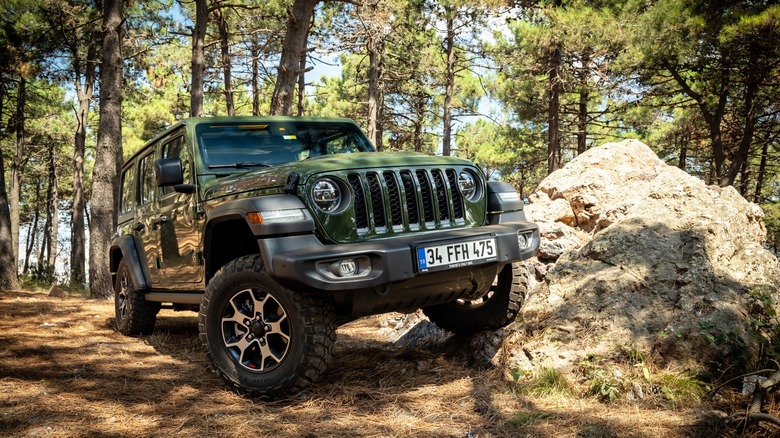
Emirhan Karamuk/Getty
Over the years, Jeep has become a household name for offering some of the best vehicles for adventure seekers. In our test drive, the 2024 Jeep Wrangler proved worthy of all the praise that it gets from off-road enthusiasts.
While impressively capable and rigid, Jeeps have had their fair share of problems throughout the years. One of the most common issues Jeep drivers face is what people call «Death Wobble.» The term refers to a sudden and erratic shaking of the entire chassis, especially at higher speeds. The vibrations can be severe enough to rip the steering wheel from your hand, inducing a lot of fear and leading to hazardous situations on the road.
Although Death Wobble is predominantly associated with Jeeps, it doesn’t exclusively occur in these vehicles. Technically, any lifted truck with solid front axles and coil springs can experience such problems.
Death Wobbles can be quite scary, especially since they seem to happen without any noticeable prior issue. However, if you know what causes it and how to handle it, you can control the situation when the steering starts to violently shake, seemingly out of the blue. What’s more, you can even prevent it from happening if you take the correct measures.
What is ‘Death Wobble’ and what causes it?
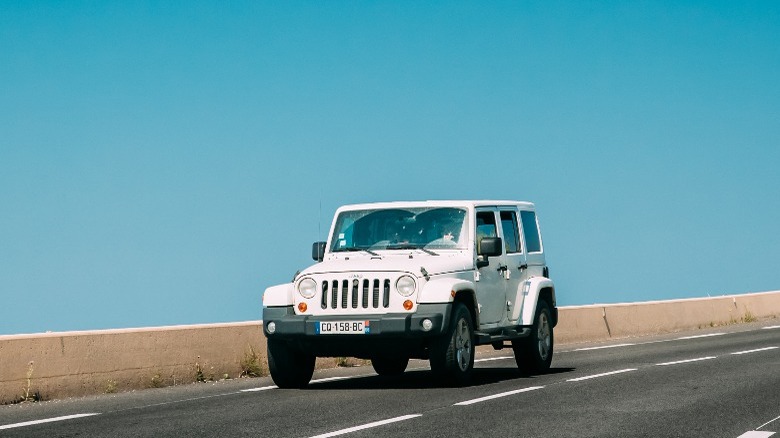
Bruev/Getty
Death Wobble occurs due to a mechanical defect that leads to violent and sometimes uncontrollable shaking in the vehicle’s steering and suspension. Usually occurring at speeds above 55 mph, the issue typically presents itself right after the vehicle abruptly receives an impact from the road. Any pothole, speed bump, or even road conjunction can result in a Jeep’s Death Wobble.
However, the root cause is usually an issue with the vehicle’s components, most commonly the suspension. Vehicles like the Jeep Wrangler are intended to tackle unforgiving trails, and it’s no surprise that such extreme environments can take a significantly bigger toll on your vehicle compared to a daily commuter that never goes off the tarmac.
Worn-out parts and loosened joins and links are primary contributing factors to the Jeep Death Wobble. When inspecting the suspension, pay attention to track bar bushings, tie rods, and ball joints. Any defect in such components can cause the front axle to wiggle side to side under the chassis, waiting for the next pothole to start shaking more dramatically.
Besides the suspension system, you should also look for problems with your wheels and tires that can cause this issue. Uneven tire pressure can cause an imbalance in your tire that can trigger Death Wobble. Moreover, misaligned wheels can also cause a lot of imbalance in your entire suspension system, ultimately leading to the Death Wobble.
What to do when you experience ‘Death Wobble?’
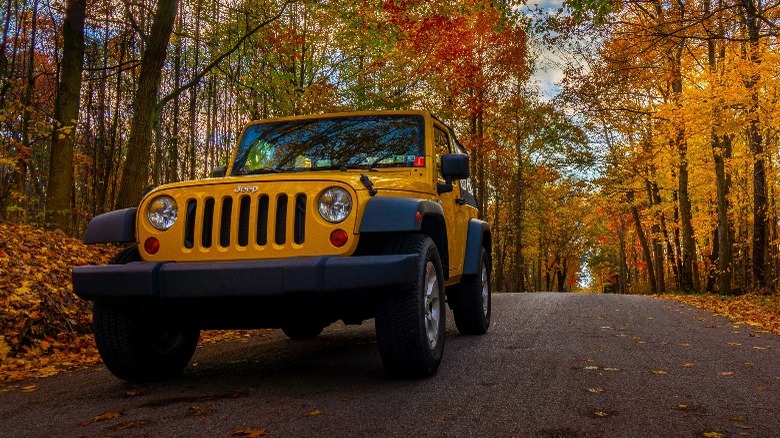
Adam Kenneth Campbell/Shutterstock
It is natural to be scared or even panic when Death Wobble happens. Although it sounds scary, it’s not as fatal as you might think. Remember to remain calm and gradually lower your speed. As you try to lightly take control of the steering, look around to find a safe place to come to a full stop.
The vibrations usually continue as long as the vehicle is still in motion, which might make it trickier to maneuver through traffic and park on the side of the road. Therefore, you should be extra careful to keep yourself and other drivers out of dangerous situations.
Thankfully, most of the time Death Wobble disappears once you come to a full stop and start driving again. However, that doesn’t mean it won’t happen again. After you stop the car, take a look at your wheels and suspension for any loose parts. Usually, moderate knowledge and tools can help you tighten loosened rods and joints.
Nevertheless, avoid driving at higher speeds with your vehicle and visit a mechanic as soon as possible. If the vibrations were still present after you fully stopped before continuing on your route, you should tow your car to a Jeep dealer.
What has Jeep done to fix this issue?
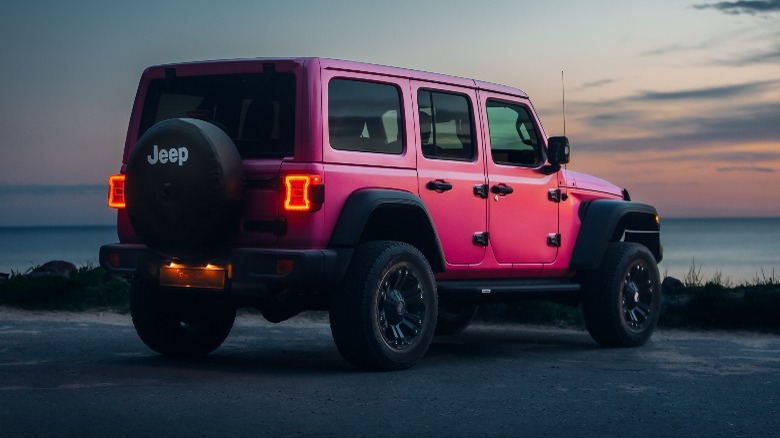
BoJack/Shutterstock
The Fiat Chrysler Automobiles company (FCA) faced a lot of problems because of the Death Wobble that predominantly plagued Jeep Wranglers. To offer a remedy, FCA recalled over 190,000 Wranglers from 2018 and 2019 to replace the front suspension steering damper.
However, many Jeep owners complained that FCA’s fix missed the mark. In many popular Jeep forums, customers stated that they experienced the Death Wobble even after having the new steering damper installed. Since it failed to address the issue properly, FCA is facing a class action lawsuit and the National Highway Traffic Safety Administration (NHTSA) has started independently investigating the causes of Jeep’s Death Wobble.
Although some 2018 and 2019 Wranglers have been recalled for a steering damper replacement, Jeep hasn’t acknowledged any defect coming from the factory in previous model years. 2015 to 2017 Jeep Wrangler owners have also repeatedly complained about dealing with the notorious Death Wobble on the road.
‘Death Wobble’ might not even be Jeep’s fault
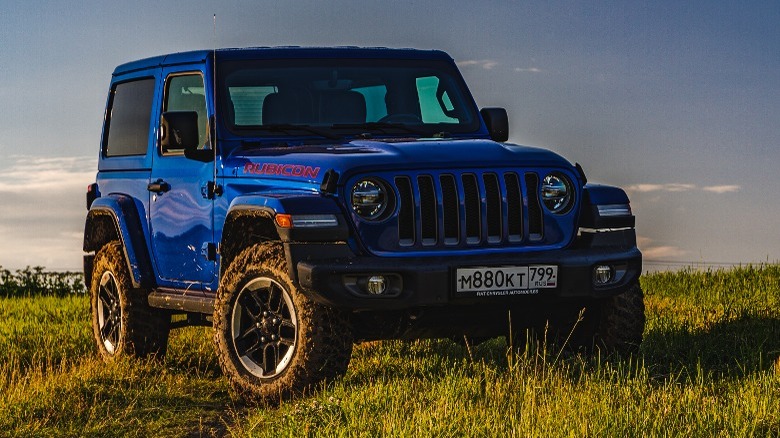
Roman Vyshnikov/Shutterstock
As mentioned earlier, such a problem can occur on any 4×4 vehicle with a solid front axle. It’s just that since the Wrangler has had this recurring issue for many years, many associate Death Wobble with Jeeps.
Although some factory-tuned Jeeps suffer from this issue, Death Wobble is much more common in modified models. Modded Jeeps with aftermarket parts that are even less reliable than the original ones are more prone to this issue. Moreover, even if you get decent quality parts, not paying attention in the installation process can result in more risk of dealing with Death Wobbles.
Poorly installed and low-quality aftermarket suspension setups have a reputation for causing a lot of problems for lifted Jeeps. A common misconception is that when you lift these trucks, you don’t need to check wheel alignments so long as the toe remains the same. However, since the caster significantly changes upon any adjustments to the front axle, you must align the wheels afterward. This issue alone can cause wobbles and vibrations whenever your Jeep goes over a pothole or a bump on the road.
You should always maintain your vehicle regularly, especially if you traverse tough terrains a lot. Always check for wear and tear on your Jeep’s suspension and steering components to ensure you minimize the risk of dealing with one of Jeep drivers’ most common complaints.